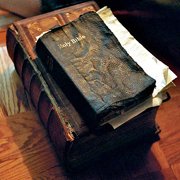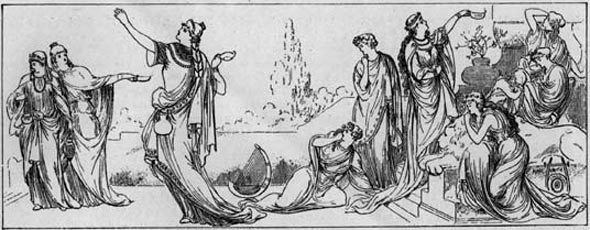
| Back To Meditation Home Page |

Custom Search
|
Are we Living in the Last Days...End Times? See Breaking News |
 |
| __________________________ |
 |
_________________________ |
| __________________________ |
As You Study the Biblical Last Days in the News... Discover the Bible As Well |
 |
| __________________________ |
 |
| __________________________ |
 |
| __________________________ |
To Know God's Word Read Scripture |
 |
_________________________ |
To Read God's Word Your Reading Schedule |
 |
_________________________ |
 |
| __________________________ |
Thought Provoking Articles for Your Meditation |
 |
_________________________ |
|
Those Scary Ten Virgins |
|---|
 |
This parable of ten virgins is controversial and downright scary to some. In this allegorical tale most interpret Jesus as the bridegroom and the Church as the ten virgins (the Church as being those who have accepted Jesus as their Lord and Savior). Somehow, part of the Church (the wise virgins) has enough oil (the Holy Spirit) for their lamps, and is allowed to enter the marriage feast. Other parts of the church (the foolish virgins) do not have enough oil, go look for some, buy some oil, but are not allowed into the marriage. The door is shut to them. They beg to be let in but the bridegroom utters some very scary words."I know you not". Those who believe salvation is a gift of GOD, given by His grace, might wonder if grace is all that is required. Lack of oil (the Holy Spirit) is a huge problem! How does a believer lack the Holy Spirit? Doesn't the Holy Spirit reside with a believer? What else is necessary? What does GOD really require? Maybe Salvation isn't a free gift after all.Agggggggghhh! |
 |
You may have questioned what in the world this parable means yourself. For a good place to launch an investigation, of one point of view of this difficult parable, it would be prudent to start at the beginning, or rather a little before the beginning. Jesus initiates this parable by saying "Then shall the kingdom of heaven be likened unto ten virgins". When is "then"? Jesus has just previously described, to his disciples, the horrors of the Tribulation in Matthew Chapter 24. The parable of the ten virgins is referenced to a time "immediately after the tribulation of those days". (Read Matthew chapters 24 and 25 together to see the infered reference)
What began earlier? Why had the virgins waited so long? A bridegroom is mentioned, where's the bride? How do marriage customs of that day compare to what we now see? In Jesus' day when it came time for a man to wed a woman, he approached her father to ask for her hand in marriage. A brief negotiation followed where the price he was required to pay, as compensation for the family's loss of their daughter was determined. It was called the bride price. If acceptable, and if the daughter agreed to become the man's wife, they were officially betrothed and he went away to build a home for them next to his father's house. This could take some time, and the couple rarely met again until the father of the groom pronounced the newly built home fit for habitation. Only then could the date be set, and the man given permission by his father to go collect his bride for the wedding. During this time the young woman was to watch and wait. She and her bridesmaids were to maintain a constant state of preparedness, since she would not know the wedding date until the bridegroom actually appeared for her. For his part, the groom would usually try to show up unexpectedly to surprise her, carrying her off suddenly "like a thief in the night" when no one would see them. When the bridesmaids discovered the bride had been "snatched away" there would be a great torch-lit procession, announcing to the whole town that the wedding banquet was about to begin. Ten young ladies would be somewhere along the route between the bride's house and the groom's house. They would wait for the bride and groom to return and they hope to join the procession and enter with them into the festivities. If they are with the crowd, they will be able to slip right in. If they aren't with the procession, then the doorkeepers will turn them away because they don't know them. They don't have an invitation. This was typically a seven-day celebration during which the bride and groom were hidden away in their private rooms while the whole town made merry. The father of the groom paid for all the festivities. Allegorical symbolism in scripture is consistent. All through the scriptures, whenever the term bridegroom is used symbolically, it always refers to Jesus. The Bride of Christ is uniquely descriptive of the church.
The virgins cannot represent the Bride. By taking note of the custom of the day, the Bride was "snatched away" earlier while the bridesmaids slept. The bridesmaids represent people on Earth during, and particularly at the end of, the Tribulation after the church has gone (at the rapture). Now it's time for the wedding banquet but some bridesmaids lack sufficient oil to light the way. Asking to borrow some from their friends they're refused, since there might not be enough to go around, and sent off to buy some for themselves. By the time they return the banquet has already begun, the door is closed and they're refused admission, the bridegroom claiming that he doesn't even know them. The symbolic use of oil does refer to the Holy Spirit. The Holy Spirit is a gift uniquely given to believers at the moment of salvation.
You cannot get the Holy Spirit for others nor can they give any of theirs to you. Each of us has to receive it by ourselves and for ourselves. It is our choice. The virgins with oil represent those who will have given their hearts to the Lord during the Tribulation period after the Church has gone, while those without it symbolize others who haven't, and only those who have will be invited in. The parable of the ten virgins is one of the clearest warnings Jesus ever gave to those He would find still on Earth when He returns. Those alive at that time are encouraged to make sure they're ready to receive Him while there's time. When Jesus comes back at the end of the Tribulation period, He'll find both believers and unbelievers present on Earth. Having previously spirited His bride (the church) away, He'll now decide who should be allowed to participate in the blessings of His Kingdom using the presence of the Holy Spirit (the "sealed", described in Revelation) in each one's life as the determining factor. Those in whom the Spirit resides when He returns are invited in but those without it will be excluded. Because just as importantly, the parable teaches that His return signals the deadline after which even the request to be saved and receive the Holy Spirit will be denied. The foolish virgins were on their way to get oil when the bridegroom arrived (there is no evidence they actually got any oil, only that they begged the LORD to be let in to the feast). The door will be closed, and the Lord will deny ever knowing those who've asked too late. By not deciding for Him, they will have decided against Him and once His return proves them wrong, there'll be no opportunity to change their minds. If the above opinion on the tale of the ten virgins is correct, this parable does not have much direct application to us, who are represented as the Bride of Christ. This parable may be more directed toward Jewish people alive during the Tribulation period. We can draw some important principles from the story however. Faith is demonstrated by action. We are to be ready, as the bride, for Jesus will come for us as a thief in the night, just as in the Jewish wedding customs described above. Just because people have heard and been impressed by the truth, doesn't mean they believed. Certainly there will be Jews, and possibly others, living at the end of the Tribulation who have heard of the rapture and recognized it when it happened, but they will not believe. They will put it off and not be prepared when Christ returns at the end of the Tribulation. A very interesting allegory, related to this parable, seems to exist concerning the marriage customs, of Jesus' day with respect to us, the bride of Christ. Jesus our bridegroom loved and wanted us. He paid the price at Calvary. We were espoused to Him. He went away to build us many mansions. These mansions are next to where GOD dwells GOD Himself is supervising and approving the construction. He will decide when Jesus' work is complete and when He will return. Only He knows the day or the hour. Very soon the bridegroom, Jesus, will come for us, His bride, as a thief in the night. He will take us away for seven days (years) during the Tribulation. During the Tribulation we will be made ready. Our sins that were red as scarlet are made white as snow. After the Tribulation Jesus and His Bride will return for the Marriage Supper of the Lamb. Some on earth will attend the feast.some will not. Whereever the marriage customs of the Jews originated, they sure seem to tell a story!
|
 |
Is the interpretation of the parable of the ten virgins discussed above correct? Maybe.maybe not! Each, of us has the choice to read and meditate on scripture or not. Scripture promises we will be blessed by meditation on GOD's Word. If you have doubts, questions, fears or just curiosity regarding this parable, investigate the story for yourself. You are guaranteed a blessing. Remember, the bride is the central focus of a wedding. Wouldn't you rather be the bride, instead of a guest. or even worse a stranger. left outside. That choice is yours and yours alone, as well. Be blessed and meditate or meditate and be blessed!!!!.. the choice is yours!! |
 |
Acknowledgements: The Ten Virgins, Hampton, Keathley IV, Th.M. The Parable of the Ten Virgins, Jack Kelley |